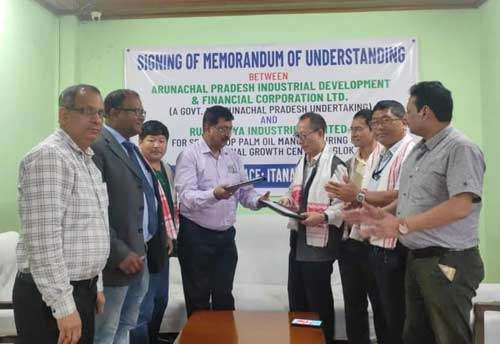India’s quest for self-sufficiency in edible oil production has taken a significant stride forward with the inauguration of the country’s first oil palm processing unit in Arunachal Pradesh. This milestone achievement not only marks a pivotal moment in India’s agricultural landscape but also holds the promise of reducing the nation’s reliance on palm oil imports. Concurrently, recent data revealing a decline in India’s palm oil imports underscores the potential impact of domestic processing capabilities on the nation’s edible oil sector.
The commissioning of India’s inaugural oil palm processing unit in Arunachal Pradesh represents a culmination of efforts aimed at bolstering domestic production and reducing dependency on imports. Located in the state’s East Siang district, the processing unit signifies a strategic foray into oil palm cultivation, leveraging the region’s conducive agro-climatic conditions for this high-yielding crop. The initiative aligns with the government’s vision of enhancing agricultural productivity and promoting self-reliance in critical sectors.
Oil palm cultivation holds immense promise for India’s agricultural sector, offering a viable alternative for meeting the country’s escalating demand for edible oils. With its high oil yield per hectare compared to other oilseed crops, oil palm presents a lucrative opportunity for farmers to boost their income and contribute to national food security. By establishing processing units like the one in Arunachal Pradesh, India aims to harness the full potential of oil palm cultivation and strengthen its position in the global edible oil market.
The inauguration of the oil palm processing unit in Arunachal Pradesh heralds a new era of economic development and empowerment for the region’s farmers. Through technology transfer, skill development, and market linkages, the processing unit seeks to uplift local communities by creating employment opportunities and enhancing rural livelihoods. Additionally, the adoption of sustainable cultivation practices underscores India’s commitment to environmental conservation and responsible agricultural development.
Concurrently, recent statistics revealing a decline in India’s palm oil imports signify a significant shift in the nation’s edible oil landscape. According to data from industry sources, India’s palm oil imports dropped by a notable margin in the past fiscal year, attributed to various factors including government policies, changes in consumption patterns, and increased focus on domestic production. This decline in imports underscores the potential impact of domestic processing capabilities on India’s edible oil sector.
The reduction in palm oil imports reflects India’s concerted efforts to diversify its sources of edible oils and prioritize domestic production. With a growing emphasis on self-sufficiency and import substitution, India has been actively promoting the cultivation of oilseeds, including oil palm, through various policy measures and incentives. The establishment of oil palm processing units such as the one in Arunachal Pradesh complements these efforts by providing the necessary infrastructure for value addition and market access.
Moreover, the decline in palm oil imports aligns with India’s broader objectives of enhancing food security, promoting sustainable agriculture, and reducing trade imbalances. By reducing dependency on imported edible oils, India aims to mitigate external risks associated with fluctuating international prices and geopolitical uncertainties. Additionally, the shift towards domestic production contributes to the nation’s economic resilience and fosters inclusive growth across rural India.
While the decline in palm oil imports signals progress towards self-sufficiency, challenges persist in realizing India’s full potential as a major producer of edible oils. Inadequate infrastructure, fragmented supply chains, and limited mechanization pose hurdles to the efficient cultivation and processing of oilseeds, including oil palm. Addressing these bottlenecks will require sustained investments in agricultural infrastructure, research and development, and capacity building initiatives.
In a nutshell, the inauguration of India’s first oil palm processing unit in Arunachal Pradesh marks a significant milestone in the nation’s journey towards self-sufficiency in edible oil production. Concurrently, the decline in palm oil imports underscores the tangible impact of domestic processing capabilities on India’s edible oil sector. Moving forward, concerted efforts to promote oil palm cultivation, enhance processing infrastructure, and support farmers will be crucial for realizing India’s vision of achieving food security, economic prosperity, and sustainability in the agricultural sector.


